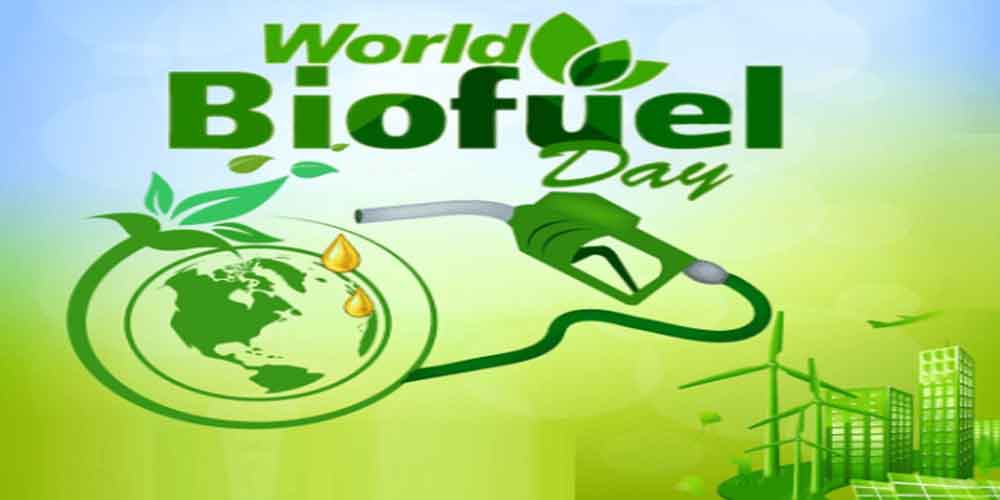Dr. N. Munal Meitei,
Environmentalist, email -nmunall@yahoo.in

Ministry of Petroleum and Natural Gas observed World Biofuel Day on 10 August to popularise the uptake of blending biofuel in India – the world’s third largest oil consumer. Biofuels are environment-friendly liquid fuels derived from biological materials like agricultural waste, trees, crops or even grass including algae or animal waste. The day highlights replacing non-renewable fossil fuels to mitigate the climate change with renewable energy sources derived from organic materials. Biofuels play a crucial role as they are considered a cleaner alternative to fossil fuels to restore our planet’s health by reducing pollution and for a more environmentally friendly future.
The theme of this year is ‘Biofuels as a sustainable solution: Reducing Waste, Feeding Energy’. Biofuels are one of the most noteworthy creations of history. Biofuel additionally feature natural advantages for promoting sustainable energy, causing less damage to the climate in contrast to non-renewable fossil fuels. Renewable energy reduces climate change and diminishes the emissions of greenhouse gases with less contamination of air and water.
Transport is the least diversified energy end-use sector: it consumes about two thirds of global oil demand – with more than 90% of the final energy consisting of oil products and roughly 25% of global energy-related CO2 emissions. Emissions from transport increase by 2% annually, reaching 8 Gt CO2 in 2023. Road transport, mostly for passenger travel, accounted for three quarters of total transport emissions.
India’s ethanol capacity has grown from 1.53% in 2013-14 to 7.93% in 2020-21, with rising supply from 38 crore litre to 322 crore litre during the same period. The ethanol distillation capacity has also doubled and the number of distilleries has increased by 40% for the country in the last five years.
Furthermore, the National Policy on Biofuels – 2018 aims to achieve 20% ethanol-blending and 5% biodiesel-blending by 2030 to align with the vision of World Biofuel Day. Moreover, the policy was amended in May 2022 to allow more feedstocks, advance the ethanol blending target to 2025-26, promote biofuel production in Special Economic Zones/Export Oriented Units and allow specific cases of biofuel exports. Additionally, the government decreased the GST on ethanol meant for blending into fuel from 18% to 5%.
There are 5 categories of biofuel in the India; Biodiesel, Bioethanol, Bio-CNG, Drop-in Fuels and Advanced Biofuels. The Biofuel move has saved foreign exchange worth over Rs. 47538 million last year and the target is to take this number to around Rs. 141.78 billion over the next four years.
Biofuels have the benefits of reducing import dependency on crude oil upto Rs. 22,600 crore, cleaner environment and employment generation in rural areas. The biofuels program is in synergy with the Make in India, Swachh Bharat and enhancing farmers’ income.
At present, approximately 850 crore litre of High Speed Diesel (HSD) is consumed on a monthly basis in India. In order to achieve the blending target, 500 crore litre of Biodiesel is required in a year. In India, approximately, 2700 crore litre of cooking oil is used out of which 140 Crore Used Cooking Oil (UCO) can be collected from bulk consumers such as hotels, restaurants, canteens, etc. for conversion, which will give approximately 110 crore litre of Biodiesel in one year. Thus, if we could establish collection chains, there is a huge opportunity in production of biodiesel from UCO.
Biodiesel blending in the country started in 2021. Ethanol and ethanol-gasoline mixtures burn cleaner and have higher octane levels than gasoline that does not contain ethanol. One crore litre of ethanol blended petrol can save around 20,000 tons of CO2 emission. Greenhouse gas emissions due to the EBP Programme were reduced by 31.82 million tons from 2014 to November 2022.
But biofuels have a limited ability to replace fossil fuels and should not be regarded as a ‘silver bullet’ to deal with transport emissions. In 2008, the Nobel prize-winning chemist, Paul J. Crutzen published findings that the release of nitrous oxide emissions which effect is about 300 times stronger than that of CO2 in production of biofuels means that they contribute more to global warming than the fossil fuels they replace.
As the global environmental consciousness strengthens, these renewable biofuels arise as a vital catalyst in shortening carbon emissions by as much as 90%, changing toward a more sustainable and ecologically conscious planet. Biofuels can be produced in a very short time and stored in either liquid or gaseous form. In contrast to fossil fuels, biofuels are renewable, sustainable and biodegradable in nature.
Most studies have found that producing first generation biofuels usually yields reductions in greenhouse gas emissions of 20 to 60% when fossil fuels are replaced. Biofuels can provide fresh momentum to India in the 21st century and also reduce rising pollution concerns. The formulation will be helpful for the agricultural sector which constitute 54.6% as it utilizes excess agricultural production to generate fuels. Thus, biofuel is a big hope for the future and the environment.













